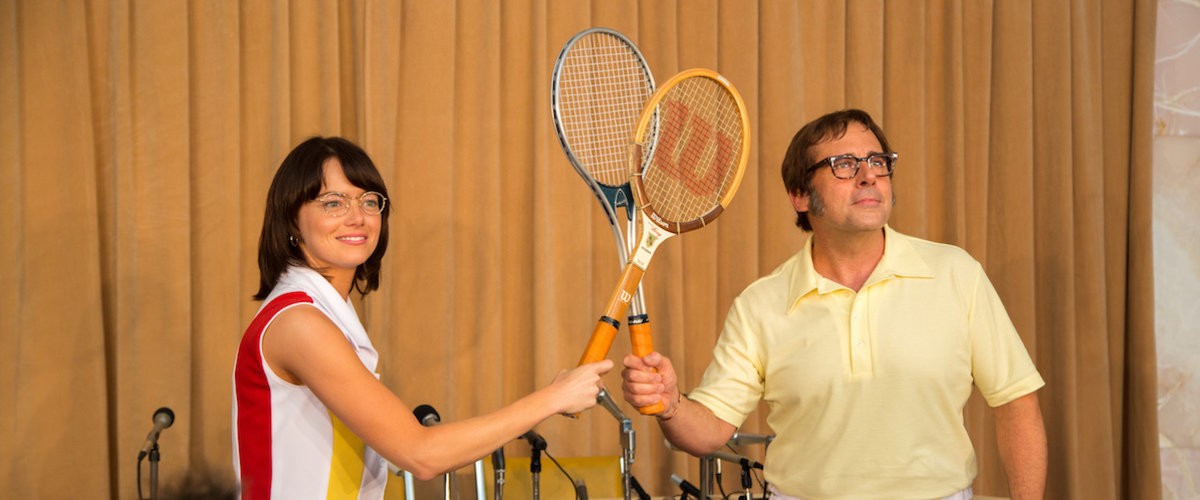To this day, the most-watched tennis match in American history is not a Wimbledon final, or a U.S. Open match. In 1973, Bobby Riggs, former Wimbledon and U.S. Open champion and self described male chauvinist, and Billie Jean King, a feminist icon who was in the midst of a historic roll on the women’s tennis circuit, played a match in the Houston Astrodome in front of a live audience of more than 30,000 and an estimated international TV audience in excess of 90 million. It was both a coming out party for women’s tennis and a major cultural event at a time when the nationwide push for the Equal Rights Amendment (ERA) was in full swing.

Emma Stone and Steve Carell in Battle of the Sexes
The best thing about Battle of the Sexes, the sprawling story of the grudge match seen ‘round the world, is the casting. Emma Stone plays King, disappearing into the role in a way she has never done in any of her previous films, and Steve Carell plays Riggs, a 55-year-old, washed up tennis pro turned huckster. Riggs’ gambling problem is so out of control that even when he wins a Rolls Royce Silver Spirit from sneering rich guy Jack Kramer (Bill Pullman) it still gets him kicked out of his huge house, owned by his rich wife Priscilla (Elisabeth Shue).
The supporting cast are all aces as well, led by Sarah Silverman as Gladys Heldman, Kings’ agent and partner in the new and struggling Women’s Tennis Association. Alan Cumming vamps freely as Ted Tinling, a fashion designer who put color on the court for the first time, and Fred Armisen has a small but scarily committed role as Riggs’ Dr. Feelgood, Rheo Blair.
The performances are where husband and wife directing team Jonathan Dayton and Valerie Farris excel, as you can easily see in their last big hit, Little Miss Sunshine. Battle of the Sexes is an accomplished, entertaining work. Where it runs into problems is the reconciling the tone. Stone and Carell are not only playing different characters, but they sometimes appear to be in completely different movies. King’s story is a coming-out drama, where she realizes that her friendly but largely loveless marriage to her husband Larry (Austin Stowell) is doomed to lose out to her love for her hairdresser, Marilyn (Andrea Riseborough). Riggs’ side of the story is a clown show of over-the-top sexism and hype, powered by a barely contained Carell.
What the film lacks in artistic unity, it makes up for with a series of memorable, well-wrought scenes, like Riggs’ meltdown in a Gambler’s Anonymous meeting and an exquisite sequence where Kings’ two lovers accidentally meet in an elevator on the way to the same hotel room. Battle of the Sexes is a well crafted film that feels timely, fun, and occasionally even poignant